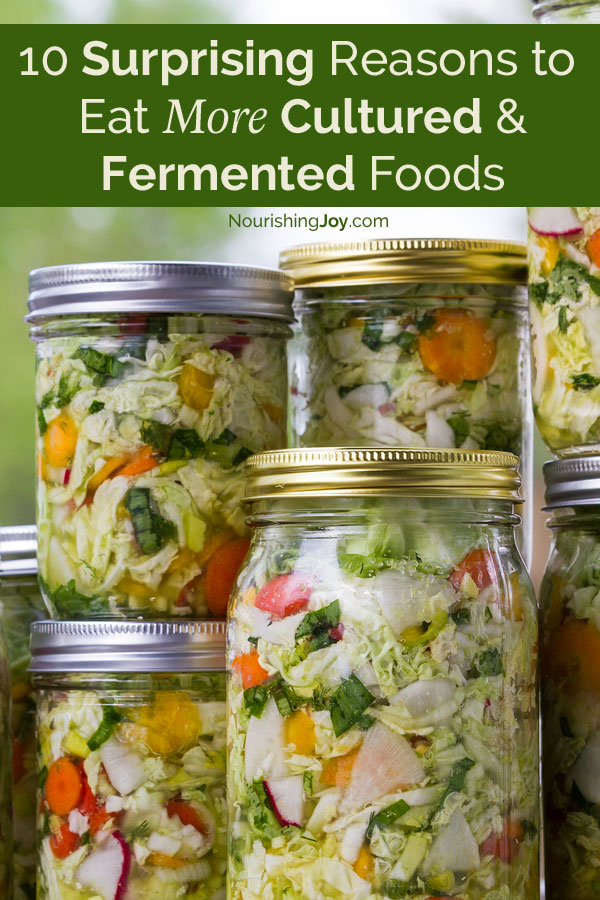10 Reasons to Eat More Fermented and Cultured Foods
This post may contain affiliate links, including those from Amazon.com, which means we earn a small commission off your purchases. And here's the thing: We only mention services and products that we think are truly worth your attention, whether they're free, paid, or otherwise. This site relies on YOUR trust, so if we don't stand behind a product 110%, it's not mentioned. Period.



One of Nourishing Joy's Ten Real Food Goals is Eat (At Least) One Cultured or Fermented Food Each Day. But what's the big deal with fermented and cultured foods anyway?
I know many who are turned off by the word “fermented” (including myself, just a few years ago) as “fermented” conjures up images that are… well, unpleasant. Quite to the contrary, fermented and cultured foods are exquisitely exciting, delicious, and downright essential.
Long before refrigeration was available, lacto-fermentation was the method used to preserve food from the time of harvest into the winter months. It also has the side benefit of actually increasing the nutritional value of certain foods and of keeping our guts optimally healthy. The gut is where more than 95% of our digestion and absorption of nutrients take place, after all, so this is vastly important.
A note about the term lacto-fermentation: this fermentation process doesn't have anything to do with lactose or dairy products. It actually refers to the lactobacilli – more affectionately known as lactic acid bacteria – that are present during fermentation.
And fermented foods aren't just shredded vegetables, like sauerkraut or the gorgeous kraut pictured above. Fermented foods include salami, yogurt, lox, sourdough bread, pickles, kombucha, and many many more! If you need inspiration to figure out which fermented and cultured foods you like best, start with our list of 101 Fabulous Fermented Foods.
So here are ten reasons why you should eat at least one fermented or cultured food every day.
How to Eat More Fermented and Cultured Foods
Fermenting vegetables increases their nutritional content
We all know fresh vegetables are a treasure trove of vitamins and minerals necessary for our health. However, in the fermentation process, the beneficial bacteria create enzymes and additional vitamins, which makes them even healthier than they were in their raw state.
Fermented foods heal the intestinal tract from damage and restore optimal health
Our modern diet, even of those of us who try to “eat healthy,” is composed of enormous amounts of refined and processed foods. These foods ravage the gut by blunting the villi (the little “fingers” that grab and process each bit of food) and killing off the beneficial bacteria, leaving the intestinal walls raw, inflamed, and unable to efficiently absorb nutrients. Yet eating fermented foods can actually heal the gut by repopulating it with multiple strains of beneficial bacteria and providing a proper pH balance.
If you suffer from lactose intolerance, gluten intolerance, irritable bowel syndrome, Crohn's disease, celiac disease, yeast infections, chronic flatulence or constipation, or environmental allergies, fermented foods may be especially important in your dietary regimen to encourage respite and healing.
Beneficial bacteria provide enzymes which aid in digestion
Fermented foods are rich in enzymes that assist us in assimilating our food. Most foods require a specific enzyme to “unlock” their nutritional potential, so these enzymes are essential. Take milk for example – it contains the sugar lactose and we need the enzyme lactase in order to assimilate lactose. By culturing that milk into a variety of products, such as yogurt or kefir, those enzymes proliferate and thus the food is easier for us to digest.
Lactic acid bacteria stimulate and support the immune system
Lactic acid bacteria enhance gastrointestinal and systemic immunity, thus keeping us healthier and better able to fight infection. As I have wanted to understand fermented foods better, I have found it fascinating to read studies about lactic acid bacteria and its role in human immunology (like this one, for example), as it's really quite amazing to see the number of ways beneficial bacteria benefit us: they help recognize foreign substances in the body, they work in conjunction with the immune cells to destroy those foreign substances, they stimulate mucus secretions in the gut, they boost antibody activity, they assist white blood cells to fight infections, and they even at times actively suppress cancer cells and tumors.
All that in conjunction with the enhanced vitamins, such as the increased Vitamin C in sauerkraut, convince me more and more that fermented foods play an extremely understated role in health and immunity from everything from the common cold to cancer!
Lactic acid bacteria fight off pathogenic bacteria
Beneficial bacteria lower the pH of the GI tract (i.e. make it more acidic), which provides an inhospitable environment for pathogenic bacteria.
Fermented and cultured foods taste good!
There’s a reason people like to eat sourdough, sauerkraut, yogurt, cheese, kefir, miso, cultured butter, lox, and traditionally cured pickles. They taste good with interesting, complex flavors. Fermentation is the original gourmet!
Fermenting and culturing your own food is cheap and easy
Most ingredients for traditional fermented and cultured food are quite inexpensive. Take sauerkraut, for example: all you need is cabbage and salt, and I can usually make a batch that will last our family 4-6 months for under $3.
Fermented foods are better than supplements
Probiotic supplements usually focus on one or two strains of bacteria, which is helpful for treating specific issues (a fungus such as ringworm or a Group B-strep in pregnancy, for example), but at times it can be problematic. For overall health, it is best to get the beneficial bacteria from foods rather than supplements because there will be a variety of different strains – and the more diverse the strains, the better for balancing the gut's bacterial colonies.
Fermented foods promote dental health
Cavities, gingivitis, periodontitis, and halitosis (bad breath) are all caused by the proliferation of harmful bacteria in our mouths. By eating fermented foods rich in lactic acid bacteria and other beneficial bacterias, we keep these in check and provide a healthy and balanced oral environment.
This also falls in line with the belief that good dental health starts with good overall diet and health – that is, teeth are made strong from the inside. Obviously, brushing and flossing is still a very healthy practice, but the beneficial bacteria are part of the overall picture. In fact, researchers from the University of Catalonia in Spain found seven different strains of lactic acid bacteria that are beneficial in keeping oral health in check!
You can ferment pretty much anything to increase its nutritional value
Nearly any food can be fermented, cultured, or cured to increase its nutritional value and to preserve it for months after harvest. Make your own condiments, for example, and encourage lactic acid bacteria to grow, and you've got probiotic, nutritionally-enhanced ketchups, mustards, salsas, and relishes!
If you'd like to know more, check out Get Cultured! How to Ferment Anything over at Nourished Kitchen. Jenny has created an incredible online course, including recipes and how-to's, that is guaranteed to inspire you!
We've also got an on-going list of easy and creative ways to eat more fermented foods – please chime in with your own favorite ideas!




i care much about my health….Thank you for the information
Can I know that fermented food is better for Diabetes?
This depends so much on your own body. Be sure to talk with your own doctor to see which fermented foods are best and safest for you.
Can you tell me if potassium stays in a fermented food? This food is also a vegetable and is brined after fermenting.
Generally, yes, but it all depends on what was in the vegetable to begin with and what ingredients you use to ferment it and brine it (and out of curiosity, why use a separate brine after fermenting?). Unfortunately, without more specifics, I can’t give much more of an answer – and really, all I can give you is generalities anyway. The best recommendation would be to have the item tested by a lab (since I notice your e-mail address is for a pickle company and assuming your question is for them) – if you’re asking simply for your own sake for home-fermented foods, then I can simply give you general answers.
I’m sorry I can’t be of more help!